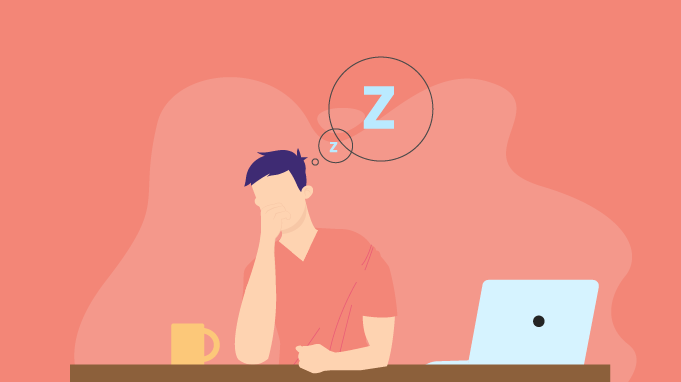
Sleep is essential for memory consolidation, or the process of cementing our memories. Memory access is a recall process, and professors emphasize the significance of getting enough sleep before taking examinations. This regulation, known as homeostatic regulation, allows the body to counteract the effects of sleepiness while sleeping. The longer a person is awake, the more sleep he requires, and the requirement for sleep builds over time while awake.
Sleep, for example, helps to rebuild and repair the heart and blood arteries. Sleep deprivation has been linked to an increased risk of heart disease, renal disease, diabetes, and stroke. A study of teens, for example, found that for every hour of sleep missed, the probability of getting fat rose. Calorie control and weight growth according to data shows that getting a good night’s sleep might help you eat less calories during the day. A research published in the Proceedings of the National Academy of Sciences of the United States of America, for example, claims that sleep patterns alter the hormones that control hunger. Sleep helps maintain a healthy balance of hormones that make you hungry, such as ghrelin and full leptin.
When a person does not sleep, their physical capacity to manage food intake suffers. Sleep deprivation has also been linked to attention deficit disorder, decreased cognition, delayed responses, and mood changes, according to research. Some people may acquire a tolerance to persistent sleep deprivation, according to research. People with sleep difficulties, on average, have worse performance, irritability, poor attention, and daytime drowsiness. People may be unaware of their own deficiencies while their minds and bodies battle with sleep deprivation, and less sleep may feel normal to them.
Sleep deprivation can cause major mood fluctuations, unpredictable behavior, hallucinations, and, in extreme and uncommon situations, death. Although sleep is involved with immune system restorative processes, sleep deprivation can induce a biological response comparable to fighting infections in healthy individuals. Recent study on the long-term health implications of sleep loss is exploring the impact of sleep deprivation on the immune system. Poor sleepers have a greater risk of heart disease and stroke, and sleep quality and duration have a significant influence on numerous health risk factors. These are the elements that are considered to induce chronic illnesses such as heart disease.
 According to an analysis of 15 research, those who do not get enough sleep have a greater risk of heart disease and stroke than those who sleep 7 to 8 hours each night (15). Many studies have found a substantial association between insufficient sleep and type 2 diabetes. Sleeping for fewer than 7 or 8 hours each night is linked to an elevated risk of heart disease or stroke. Children and teenagers who are sleep deprived may have difficulty interacting with others. They may be furious, have erratic mood swings, be gloomy or depressed, and lack ambition. They may get poorer grades and feel worried if they have difficulty paying attention.
According to an analysis of 15 research, those who do not get enough sleep have a greater risk of heart disease and stroke than those who sleep 7 to 8 hours each night (15). Many studies have found a substantial association between insufficient sleep and type 2 diabetes. Sleeping for fewer than 7 or 8 hours each night is linked to an elevated risk of heart disease or stroke. Children and teenagers who are sleep deprived may have difficulty interacting with others. They may be furious, have erratic mood swings, be gloomy or depressed, and lack ambition. They may get poorer grades and feel worried if they have difficulty paying attention.
Most individuals require 7 to 8 hours of decent sleep every night. Remember that sleeping for fewer than seven hours every night might have a detrimental influence on your overall health. Sleep is an important aspect in our quality of life since it keeps our bodies healthy and gives us the energy and attention we need to go through the day. A sleepless night can put a person at danger of disease and damage. You’re 12 percent more likely to die during a 25-year period if you don’t get enough or too much sleep. When you don’t get enough sleep, your body produces cortisol, a stress hormone.
 Sleep deprivation has been linked to an increased risk of illness, according to research. Professor Kevin Morgan and his sleep research team at Loughborough University discovered an intriguing association when he discovered that poor sleep habits were more frequent among night workers in tests on rats and studies on individuals who worked shifts at night. Professor Morgan discovered that when you don’t get enough sleep, your immune system suffers. According to research, getting more quality sleep might help the body fight illnesses. A research published in the World Journal of Gastroenterology reveals a relationship between sleep deprivation and bowel inflammation in persons with gastrointestinal tract problems. According to studies, sleep deprivation can lead to this sickness, and the disease, in turn, adds to sleep deprivation.
Sleep deprivation has been linked to an increased risk of illness, according to research. Professor Kevin Morgan and his sleep research team at Loughborough University discovered an intriguing association when he discovered that poor sleep habits were more frequent among night workers in tests on rats and studies on individuals who worked shifts at night. Professor Morgan discovered that when you don’t get enough sleep, your immune system suffers. According to research, getting more quality sleep might help the body fight illnesses. A research published in the World Journal of Gastroenterology reveals a relationship between sleep deprivation and bowel inflammation in persons with gastrointestinal tract problems. According to studies, sleep deprivation can lead to this sickness, and the disease, in turn, adds to sleep deprivation.
Sleep is not only necessary for daily functioning, but it also offers several systemic health advantages. Sleep aids in the management of our metabolism and weight, promotes a stable mood, avoids cardiovascular disease, boosts the immune system, increases information retention, and aids in short-term and long-term memory. According to a Johns Hopkins University study, sleep is essential for brain plasticity, which aids in the removal of waste products from brain cells. Sleep is essential. Sleep is as essential to our bodies as eating, drinking, and breathing, and it is critical for sustaining excellent mental and physical health. Sleep and health are inextricably linked, with poor sleep increasing the risk of bad health and poor health making it difficult to sleep. Sleep issues are frequently the root cause of common mental health concerns such as anxiety and sadness.
During Mental Health Awareness Week 2011, sleep and mental health was explored by conducting one of the largest questionnaires on sleep and its influence on mental health. Work schedules, daily stress, disturbing bedroom surroundings, and medical issues can all interfere with our ability to sleep. While a good diet and favorable lifestyle choices can help ensure enough sleep each night, persistent sleep deprivation is frequently the first indicator of a sleep problem. We’ve all heard the fallacies about getting folks out of bed and back into it: lethargy, exhaustion, and sleep problems are symptoms of a mental health condition and can be caused by medicine.
While sleep deprivation may cause damage in the blink of an eye, such as in a car accident, it can also affect you over time. Sleep deprivation may have an impact on how you think, respond, work, and learn from others. To make matters worse, a new research showed that sleep deprivation triggers the endocannabinoid system (ECB) in our brain, which increases hunger and appetite. Sleep deprivation might also make you more prone to disease since your immune system is not functioning optimally. A research revealed that those who slept fewer than 7 hours each night were three times more likely to acquire a cold than their counterparts who slept more.


